Class of 2022 arrives to start dental school journey9 min read
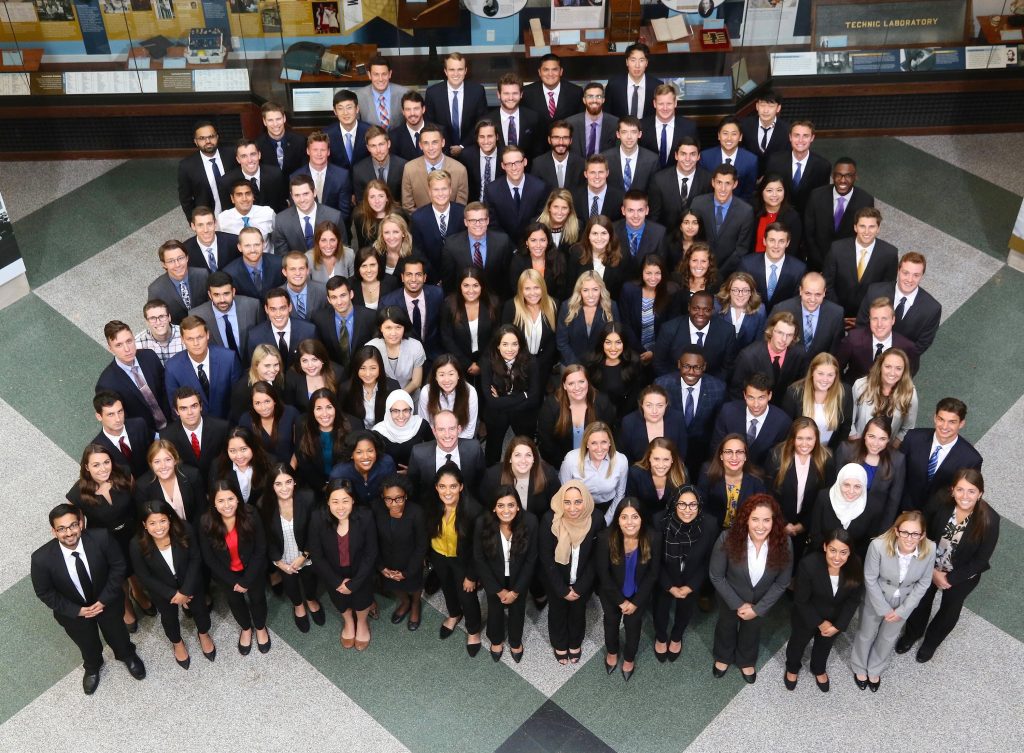
Ann Arbor, Mich., June 29, 2018 – Members of the Class of 2022 arrived this week at the School of Dentistry to begin their four-year journey through the academic, clinical and research experience of earning their Doctor of Dental Surgery degree.
Orientation started Monday and continues over the next few weeks as the class settles into its weekly schedule.
The 109 members of the class have 109 versions of how they chose dentistry and how they arrived at one of the top dental schools in the world. Those uncommon backgrounds will soon yield to close friendships and intense camaraderie born out of the shared difficulties and successes of dental school. That was a message repeated by several speakers at the first-day welcoming event.
Dr. Renèe Duff, Assistant Dean for Student Services, likened the dental school journey to climbing a mountain peak. There will be ups and downs along the route, some setbacks, lots of exhilarating moments and finally success at the top. The best way to get there, Duff said, is for students to bond together and help each other along the way. She noted the many services available to students, from financial aid to wellness to academic advising. “We’ll support each other and reach out and offer a helping hand at every opportunity,” Duff said.
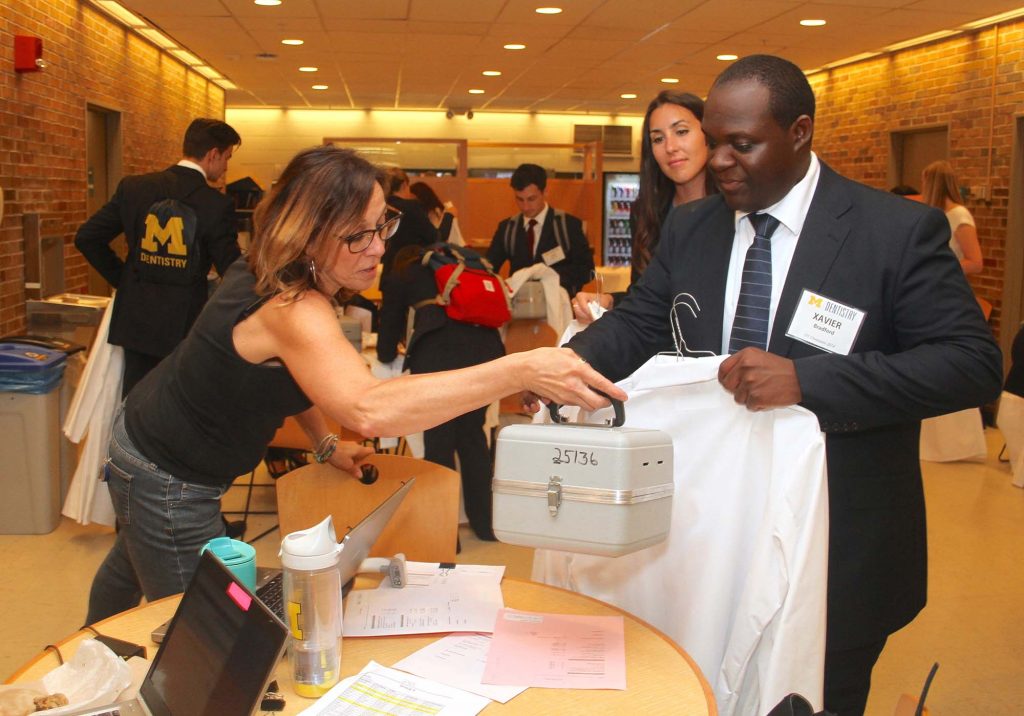
Bradford check out the necessary equipment on Day One.
Waiting her turn behind Bradford is Michaela Betts.
Dean Laurie McCauley told the new class they are now part of a higher education culture that emphasizes serving people and developing leaders. “All of you are going to be asked to enrich the future,” she said.
McCauley noted that the school’s mission statement -– “Advancing health through education, service, research and discovery” -– does not use the narrower term “oral health” because oral health is linked to a patient’s overall health. Understanding that relationship and the science behind it are emphasized in the curriculum. “Many places can train you to develop the manual dexterity skills of dentistry,” she said. “But our profession is in a phase of such rapid change relative to technology, it is absolutely essential that you understand the scientific foundation, the underpinnings, of what you will be doing so that you can adopt and adapt to change as your career goes on. I would say the most important skill we can teach is flexibility and that demands deep scientific knowledge.”
The diversity of U-M and the dental school is also a strength for the new students to recognize, McCauley said. “You have landed at a university that embraces and celebrates diversity, equity and inclusion,” she said. “That will be a true benefit for your four years here – in the development of your non-technical skills, your people skills, your ability to have empathy and compassion for your patients, for your ability to interact with people who are like you or who are not like you. These are skills that you will learn based on our values as an academic institution.”
While speakers acknowledged that the students will have to master a challenging curriculum and precise clinical skills, they also pointed out that the class has outstanding credentials and is poised for success. The 109 D1s were selected from 1,893 applicants. Their average undergrad grade point average was 3.66 and their academic and life experiences are impressive. “You are all extremely talented, capable, high-achieving individuals,” McCauley told the class. “It’s just a matter of what you make of these four years because we already know you have the talent and skills to become a ‘leader and best.’ ”
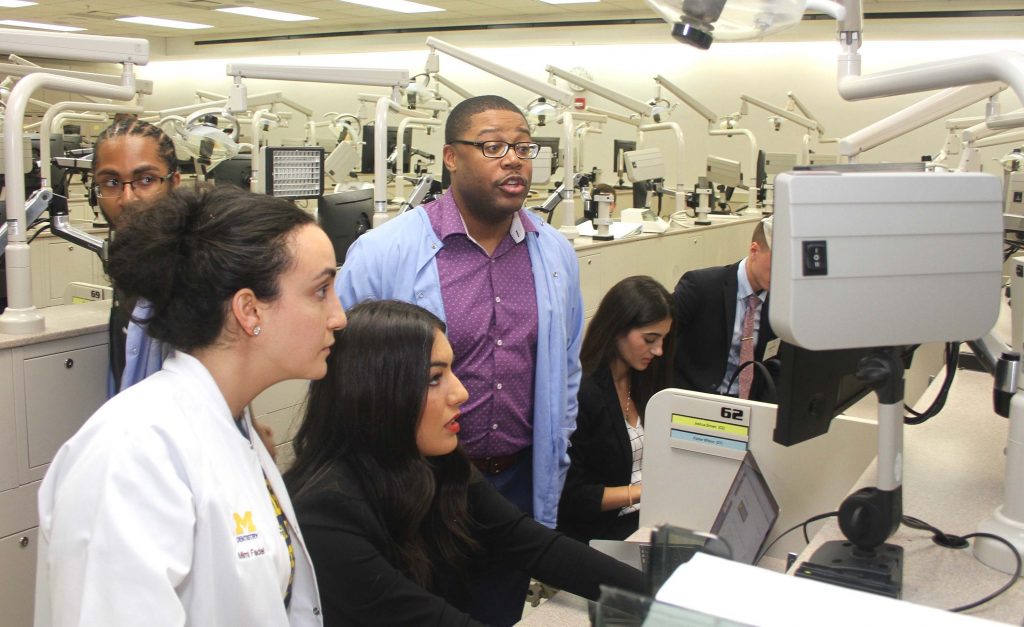
help new student Sarah Kawar log in to a computer in the Sim Lab.
At back left is George Colston, also from Dental Informatics
Tom Havlichek, from DeWitt, Mich., exemplifies the wide range of experience in the new class. When he started undergrad courses at U-M, he was generally interested in healthcare because it’s in the family – his father is a doctor, his brother attends medical school and his sister is a nurse. Yet he chose to major in Classical Civilization because he loved to study about ancient Greece and Rome. “I was thinking about all my options, my majors, because I was undecided. I could do the neuroscience or the biology, or I could do something a little different. I decided there was never going to be another opportunity for me to learn about (classical civilization) in my life unless it was on my own time. And I really, really enjoyed it.” Over time, he refined his goal to dentistry and took a fifth year of undergrad classes to meet the science requirements for dental school. He said his choice of profession was affected by observing how an aunt with Down’s Syndrome was helped by her family dentist. “Her dentist would go to her house with a mobile van and treat her there, which was really great for our family,” Havlichek said. “It really helped us out a lot. It meant a lot to our entire family.”
That experience, some shadowing with dentists and his desire to have a community impact in his professional life were factors that led him to dentistry and ultimately the U-M dental school. “I know it’s going to be hard,” Havlichek said. “I have developed a more relaxed philosophy over my five years (of undergrad). When I came in, I was pretty stressed out and I would really be concerned about things. But I think now I’m definitely going to try to take it a day at a time, a little slower. Even though it will be a much faster pace, I’m going to try to always keep in mind that it is four years, do your best, try your hardest. As long as you put in your best effort, then you can be proud of that.”
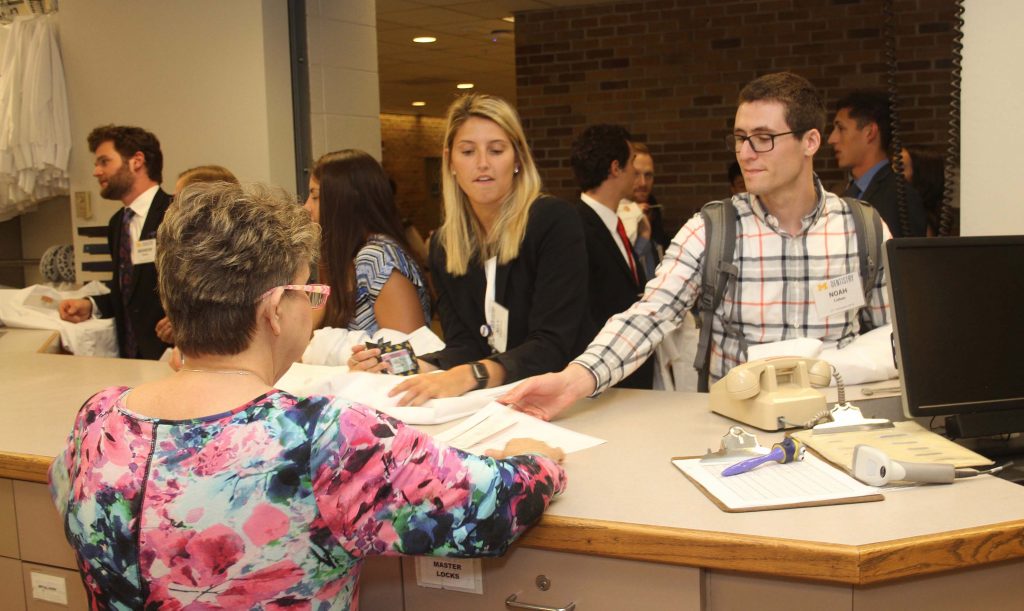
proper forms as they check out equipment and lab coats
from staffer Jane McDougall in Dental Stores.
Kaysee Ishman, who earned a bachelor’s degree in nutritional science at Michigan State University, said her major had the dual advantage of providing the science prerequisites for dental school but also serving as a back-up career if she didn’t get into dental school. An aptitude test in high school pointed toward dentistry and she said she was lucky to have a family dentist with a practice that she considers the perfect model. “Just the way that they run their practice is really cool,” she said. “They know pretty much all their patients on a very personal level. I really liked how he was able to talk to them like they were his friends, catch up on their family’s lives.” After shadowing her dentist and others, that personal approach in a smaller practice is her goal, she said.
Sitting in a lecture hall waiting for her portrait to be taken on the first day of dental school, Ishman said her initial anxiety went away quickly when she finally met some of her classmates. “It’s very laid back, everyone is very nice and easy to talk to,” she said. “I think I established pretty good study habits in undergrad. But I’ve been out of school for the past seven months because I graduated in December, so I’m a little nervous to get back into it. I’m hoping I can still remember how to study and get back into that groove.”
Avneet Takhar joined the entering class from Canada, where he graduated from the University of Windsor with a degree in biological sciences. He traces his choice of dentistry to the childhood experience of losing one of his front teeth when he was six years old. “That resulted in me spending a lot of time in the dentist’s office,” he said. “That kind of sparked my interest. And then I shadowed my dentist and one thing led to another and here I am.” Having a brother who is a dentist also helped with his decision, he said.
His first-day expectations of dental school are pragmatic. “I’m excited. I know it’s going to fly by. I know it’s going to be a lot of hard work. But I know along the way, we’ll make a lot of good friends and a lot of good connections and it will definitely be worth it at the end.”
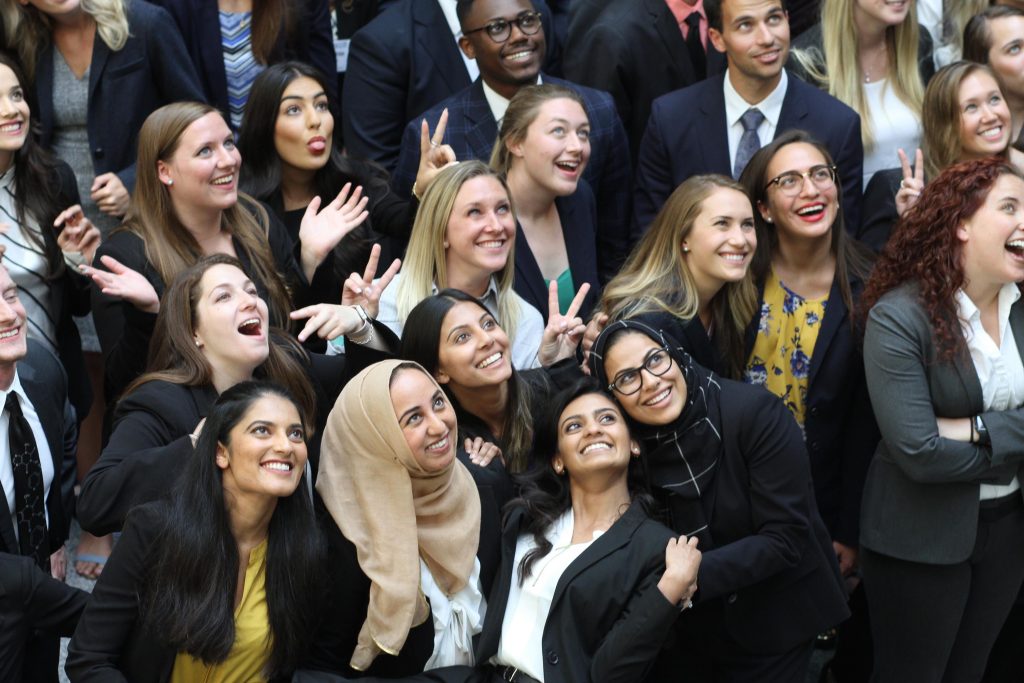
###
The University of Michigan School of Dentistry is one of the nation’s leading dental schools engaged in oral health care education, research, patient care and community service. General dental care clinics and specialty clinics providing advanced treatment enable the school to offer dental services and programs to patients throughout Michigan. Classroom and clinic instruction prepare future dentists, dental specialists, and dental hygienists for practice in private offices, hospitals, academia and public agencies. Research seeks to discover and apply new knowledge that can help patients worldwide. For more information about the School of Dentistry, visit us on the Web at: www.dent.umich.edu. Contact: Lynn Monson, associate director of communications, at [email protected], or (734) 615-1971.
